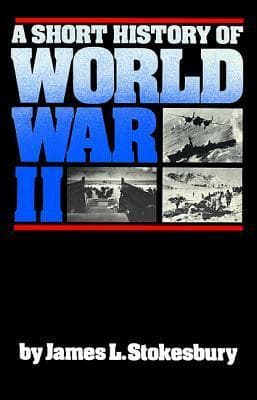
Book Review Summary: A Short History of World War II
Introduction
World War II, one of the most significant events in human history, has been the subject of numerous books. However, until now, there has been no one-volume survey that was both objective and comprehensive. Previous volumes have either been written from an exclusively British or American point of view or ignored the crucial causes and consequences of the war. "A Short History of World War II" by James L. Stokesbury is a military history that covers the period from the peace settlements of World War I to the drastically altered postwar world of the late 1940s. This article will provide a brief overview of the book, introduce the author, analyze readers' views, and summarize the reasons for recommending and not recommending the book.
About James L. Stokesbury
James L. Stokesbury is a renowned military historian and author. He has written several books on military history, including "A Short History of World War II." Stokesbury's writing style is clear and concise, making his works accessible to both general readers and students interested in understanding contemporary political events. His knowledge of military history and ability to present complex topics in a straightforward manner make him a highly respected author in his field.
Analysis of Views
- Comprehensive Overview: Many readers praise the book for providing a comprehensive overview of World War II. It covers the major battles, political decisions, and consequences of the war, allowing readers to gain a solid understanding of the events that shaped Europe between 1939-1945 and the Cold War.
- Well-Organized: The book is well-organized, making it easy for readers to follow the chronology of events. Stokesbury starts with the background causes and focuses on the basic political and military events of all theaters of war, providing a clear structure for readers to navigate through the complexities of the war.
- Engaging Writing Style: Stokesbury's writing style is engaging and accessible, making it appealing to both general readers and students. His ability to present complex historical events in a concise and digestible manner makes the book enjoyable to read.
- Objective Perspective: Readers appreciate that Stokesbury provides an objective perspective on World War II, avoiding a narrow British or American point of view. This allows readers to gain a broader understanding of the war and its impact on global politics.
- Limited Depth: Some readers find that the book lacks depth in certain areas, particularly when it comes to exploring the psychological aspects of war or delving into specific questions about the war, such as Nazi goals or cooperation between Japan and Germany. They feel that Stokesbury's focus on military strategy and chronology detracts from a more in-depth exploration of these topics.
Reasons for Recommendation
- Comprehensive Coverage: The book's comprehensive coverage of World War II makes it a valuable resource for anyone interested in understanding the major events and consequences of the war. It provides a broad overview that can be used as a starting point for further research or as a reference for those looking to refresh their knowledge.
- Accessible Writing Style: Stokesbury's writing style is engaging and accessible, making it easy for readers to understand complex historical events. The book's organization and clear structure contribute to its readability, making it an excellent choice for both general readers and students seeking a concise summary of World War II.
- Objective Perspective: The book's objective perspective sets it apart from other works on World War II, allowing readers to gain a broader understanding of the war's impact on global politics without being limited by a specific point of view. This makes it an essential resource for those seeking an unbiased account of the war's events.
Reasons for Not Recommendation
- Limited Depth: Some readers find that the book lacks depth in certain areas, particularly when it comes to exploring the psychological aspects of war or delving into specific questions about the war, such as Nazi goals or cooperation between Japan and Germany. They feel that Stokesbury's focus on military strategy and chronology detracts from a more in-depth exploration of these topics.
- Inaccuracies: A few readers have noted inaccuracies in the book, such as the part where German military doctrine was influenced by B.H.L. Hart being debunked. While these inaccuracies do not significantly impact the overall understanding of World War II, they may be concerning for those seeking a more accurate historical account.
Conclusion
"A Short History of World War II" by James L. Stokesbury provides a comprehensive and well-organized overview of one of the most significant military conflicts in human history. The book's objective perspective, accessible writing style, and thorough coverage make it an excellent resource for anyone interested in understanding World War II's major events and consequences. While some readers find it lacking in depth or encounter inaccuracies, overall, "A Short History of World War II" is highly recommended as a reliable and engaging summary of this critical period in history.